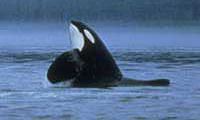The Latest News on Corky - December 2006
Corky’s Sad 37th AnniversaryDecember 11th, 2006, is the 37th anniversary of the tragic day that Corky’s family, the A5 pod of the “northern resident” community of British Columbia orcas, passed through the narrow entrance of Pender Harbour during a fierce winter storm, and had their lives forever changed. Perhaps the whales were seeking shelter or chasing fish, or investigating an unfamiliar space. It is even possible that they were looking for clues about the 7 close relatives who had disappeared in that place the year before. We will never know. What we do know is that 6 members of Corky’s family were taken into captivity on that fateful day, and that of them Corky is the sole survivor. Corky has survived longer than any other captive orca, so in a sense she is living on borrowed time. However, because female orcas in the wild live for an average 50 years, and some live much longer, in another sense she could still have many years of life ahead of her. This means that Corky can still return to the ocean and resume her life there. Such a journey, while it would be complicated, is by no means impossible. The stories of Keiko and Springer have taught us much, perhaps more than anything, to have confidence in the amazing abilities of orcas to adjust to their circumstances. Keiko crossed the Atlantic Ocean and learned how to hunt along the way; Springer, in virtually an instant, became reunited with her family. Corky has been away from the ocean, her family and community, for a very long time, but they remain at the core of her being. She is an orca. She will adjust, if she is given the chance. Corky has given much to Sea World and their corporate owner, Anheuser Busch, during the many years she has been in their hands. They have profited immensely from her “service”. They owe Corky at least the dignity of ending her days in her true home. “Freeing” Corky does not mean dumping her in the ocean and waving goodbye, but rather, setting up a step by step process in which she would be reintroduced to the ocean and other orcas carefully and systematically. An initial step, following medical assessment to ensure she poses no health threat to other orcas, would be to move her to an ocean facility where she will be able to communicate with other orcas and adjust to the ocean environment. Practical decisions governed by circumstances would determine what actually follows. Our conviction, based on everything we’ve learned about orcas, is that Corky will prove herself still capable of thriving in the ocean, and that the other orcas will welcome her back into their midst. We don’t know this will be the outcome – at the very least, the ocean facility could become Corky’s “retirement” home – but we do know that Corky deserves the chance. Time is always of the essence, but this is more so for Corky than for most. Her remarkable life will come to an end one day. If this happens in a barren Sea World tank, not just Corky, but all of us will have lost a profound opportunity. Light a candle for Corky today, and hold her in your heart. Paul Spong. Email: orcalab@island.net |
